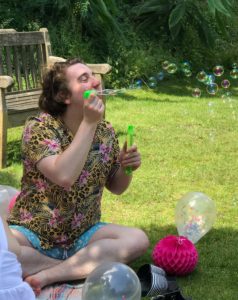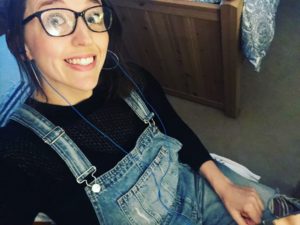First Prize
Callus
I have been thinking a lot about the body these months, and this poem speaks to that. How the body is shaped by our living inside it and within its strengths and restrictions; how it protects itself; how it wears scars like trophies of triumphs and how scarring sings out with the jagged songs of survival. Callus opens up with each reading like a matryoshka – the surprise of imagery building towards an overall metaphor. From my most recent reading, I take the idea of faith in the body – and in the spirit, as an almost religious experience. It is a poem about healing; a most welcome and heartening poem.
Second Prize
17 Sunsets to See Before You Die
An intriguing strapline hook of a title, masquerading as clickbait. Inside the poem, time moves more uncertainly as the narrator wittily and manically tries to maintain control while talking about being in the eye of the storm of the minutia of various everyday things, while heroically obfuscating the poem that might have been written – the haiku on the death of a friend. This poem has genuinely laugh out loud moments and I was seduced by this voice at first reading. Second, third, fourth and fifth readings, to part misquote the poem – my eyes were opened up so much wider.
Third Prize
Portrait Without a Sonogram
A disorientating poem, which on the page leaves lots of white spaces to fall into, intensifying the sense of disruption in form and also the representation of consciousness. The woman of the poem is at once in hospital; is in her own kitchen; is the subject of a painting; is an object; is an empty vessel on a mortuary slab. The poem seems to hold time still, but is all times at once. I read it out loud many times and the way the poem is laid out on the page slows you down into some kind of mesmerized state. An unsettling powerful poem.
Commended Poems
How to Measure a Tree
I enjoyed the rich vocabulary and the music of this poem and the staggered yet solid way that it appears on the page. All of these things build up a picture of the multifarious ways in which trees are studied, utilized and worshipped by us humans.
How the Southern Right Whale Got its Name
This is a ‘just so’ story of a poem driven on by a compelling rhythm as it gathers evidence. The repetitions of ‘right’ and the wright/ rite/ write homophones appear to make the reason for hunting the whale logical and unquestionable, until the poem’s final plea to make things right.
(Yes, I do like a ‘how to’ or instructional poem – a poem title that brings its own echo.)
Results will be with you as soon as possible
The week I am dying I get obsessed/ with the pond begins a poem which never mentions that subject directly again, and instead focuses solely on the reincarnation of the self through labour and the nurturing of growing things. This heightened week of activity rings very true to me in these days of heightened hypochondria.
Donkey
A plainly told allegorical poem which could be held up to talk about any kind of othering. Like all of the best allegories, it is as concrete as it is universal. The cliff path is narrow and the sea is perilous – the narrator accuses the two opposing donkeys of unthinkingness, while refusing to back down. There really can be no winner but the sea.
if one of us forgets to water the flowers and the herbs
I was drawn to the strangeness of this poem and because it addresses some of my own concerns of folklore, superstition and history. Phrases from the poem spun my head on its axis, such as ‘and the village folk don’t know/ which language fish are in’. I very much like the stubborn seer ‘The girl who won’t’ and imagine her quite clearly predicting plague death in her ragged dress. (The dress isn’t pictured in my poem, but it is on my head, thanks to the poem.)
Norfolk Prize
This poem contains an axe
Another poem that speaks to my love of fairytale darkness. The narrator of this poem is a hybrid of a bad mother and a murderous Geppetto. The title is the first sentence of the poem, cut in half, held above the first stanza threatening to fall – and it does, but not until the final sentence when it lands with the full glee of itself. Until then, the poem is all suspense and you fear for the whittled boy. Phrases such as ‘thickety cupboards’ and ‘a trickly stream . . . articulates its peaty creep across the hall’ are witchy and seductive and help to build a glorious sense of unease.
First prize goes to Damen O’brien
Callus
She has a line of blisters from her last race
tattooing her ankle where the brace
stabilised her foot – little snake bites.
The assault and battery of hard-
pack trail has wrought corralled ridges
on the heel, on the ball of her toe.
So many builder’s hammers tapping
down the nails of her feet, the soles
of her feet, its contours are a runner’s
and she no longer notices them, having
chosen them, the way Rocky bloodied his knuckles
on a side of beef with a prize-fighter’s
inurement to consequences, his ears curling
and fat with pounding, the white scars under
each eye, his slow pugilist’s tongue.
These scarifications are a blacksmith’s life: taking
a brittle bar of iron and with a little heat, a little coal,
an artist’s patient blows, raising the resonance of steel.
A callus starts with something soft and supple:
a kiss on the mouth of a trumpet, which lets Satchmo
call a crystalline double G from a hard embouchure
or one hundred thousand drumming strikes
that produce a runner, cumulatively, stubbornly,
a shaped swirl of metal, a champion’s knuckles.
There’s no reason to a callus, no knowing which
trauma or triumph will produce them. Sometimes
the skin breaks and weeps, sometimes it’s a caulk
for the black seep of an old hull. Enough
to keep a mariner afloat. You can’t see it, but
you know it’s there, doing its job, pushing back.
Damen O Brien is an Australian Poet living in Queensland. In 2020, Damen won the Moth Poetry Prize, the Newcastle Poetry Competition (UK) and the Newcastle Poetry Prize (Australia). Damen’s first book, ‘Animals With Human Voices’ is forthcoming through Recent Work Press in September 2021. (www.dameno.org)
Second prize goes to Alex Russell
17 Sunsets To See Before You Die
Ever since I learned that hurricanes have eyes
from an episode of The Simpsons, I spend
more time than I’d like to admit thinking I am
in the eye of various things. “We’re in the eye
of the storm now” I say, in multiple situations,
for my own benefit only. I keep variations to myself,
often and excitedly. “I’m in the eye of the service
station now” I say softly while enjoying a cherry
cola and overpriced fries, halfway through a long
trip with your whole life in the boot and back seats
of a reasonably priced automatic Vauxhall, except
for the parts of your life that are on my lap
as we drive. “I’m in the eye of this presentation
about how to use attendance monitoring software
which will almost certainly have a total overhaul
of the user interface within two months, rendering
almost all of this information outdated” I write
in the white space of poorly typeset handouts,
in between clipart and haikus about an old friend
who died before I got to introduce him as such,
before I could take a trip and by kind coincidence
bump into him at a service station, a warm surprise
after a long drive, the imprint of a toaster still
slightly visible on my inner calf after I tried to nestle
it under the seat and got it stuck. “We’re in the eye
of I, Robot now” I would have said at minute 52
of its runtime, if I had ever sat down to watch I, Robot
intentionally. Instead I’ve caught snippets of it here
and there accidentally, enough times that I feel like
I understand the plot exactly as much as I would
if I’d watched it once on purpose. I have a theory
that you can fall in love with a stranger in the same
way you can know most details of what a movie
is about even if you’ve never tried to consume it.
I’m in the eye of my entire life most of the time,
moving carefully, just enough to stay central.
At least, that’s how I like to imagine it. The two
of us dancing, along with everyone else I’ve ever met,
slightly anxious, trying to make it all a bit wider.
Alex Russell is a non-binary poet, youth mental health practitioner, and editor in chief at Placeholder Press.
Third Prize goes to Amelia Loulli
Portrait Without a Sonogram
the woman is indoors on a lightless January day she is
on the floor in a cubicle lights on the woman is in her kitchen
wearing her dressing gown wearing a standard issue gown
tied at the back the woman has her back to her washing machine
the woman is the only person in the room she is wearing a pink gown
with insistent flowers she is sitting on the forest floor the woman
is laying on a bed big enough for only her body her hands in her lap
the woman is in her kitchen lights off the woman is in a room
made of blue curtains a glass of water at her feet the woman is
sleeping under a small table on wheels beside a tower of three-a-day
pill pots the woman is beside a broken row of trees the woman
has red cheeks resting her head on her washing machine mid-spin
the woman is far from the sea wearing white socks the woman
is in her kitchen wearing no rings sleeping under a whiteboard
her name a date the woman has an orange skin marked only
with the crescent indent of her thumbnail the woman is waiting
for the painter to finish she is sleeping next to a chair her bags and coat
the woman is an animal who didn’t run she is being painted
with a blue cellular blanket over her knees the woman is a target
resting woundless legs the woman is lying arms splayed
open dry lips the woman is thinking she will peel the orange
the woman is lying hands as far apart as can be she is realising
her insides have all been removed she can’t eat the woman lies
her hands nowhere near prayer tongueless she can’t breathe
the woman is being painted palms up hands empty
Amelia Loulli is a poet and writer living in Cumbria. A pamphlet of her poetry was published in 2019 by Nine Arches Press in Primers Volume Four. In 2020 she was shortlisted for the Oxford Brookes International poetry competition and longlisted for the Women Poets’ Prize. Her work has been shortlisted for the Bridport Prize three times. She is currently undertaking an MA in poetry at Newcastle as well as working on a pamphlet of new poems and a verse novel.
The Norfolk Prize goes to Jane Wilkinson
This Poem Contains an Axe after This poem contains gull song Kayo Chingonyi
held above a head, two hands weigh up
its options: to hack the log or not. Can we stop
the next chopped conjunction? halt the whet-edge
contact with holly trunk or reddish yew flesh,
mute sound for a second to disclose smaller notes,
wood-smoke settling in the sofa cushions, uneasy
simmer on the stairs as a trickling stream
steps down, articulates its peaty creep across
the hall, soaking the kitchen. In dark thoughts
of thickety cupboards appliance lights glare
in pairs. Their tiny red eyes spy my whittled boy
fleeing through the back door, his bells for buttons
ring and my legs are brittle kindling twigs, my skirt
is paper bark. It’s not the clock’s dogged tock
you can hear starting up – the door bangs shut –
not the cluck of tongue sucked from the roof
of my dirty mouth, it is the sweet-spot split.
Listen! The precision-made steel-blade lands.
Jane Wilkinson is a landscape architect living in Norwich. She is published in numerous magazines including Ink Sweat & Tears, The Alchemy Spoon, Finished Creatures and Magma, and is in anthologies with Emma Press and Live Canon, she was shortlisted for the Alpine Fellowship Prize 2019 and placed in a number of competitions including 1st and 2nd in Guernsey Literary Festival Poetry Prize 2020 and Ist in Strokestown International Poetry Prize 2020.
Twitter @JMcCarthyWilkin
Instagram janemccarthywilkinson
Commended
Katie Hale
How the Southern Right Whale Got its Name
Because it was the right speed to be hunted,
because its buoyancy was right
to float for collection, harpooned
on the right side of pelagic, was right
for products extracted right on the beach
and like all in such rich waters, coin-right –
because it was lamp-right, soap-right, greased
the right-angled joints of an Arkwright,
because of the repeated rites of fat-slick metal:
the flensing rite, the sawing rite, the rite
of boiling bone from body, of wicking
away the oil – the grinding and barrelling rite –
because of the smoke-thick myth of it, wrought
from suffocated stations, from the shipwright,
the mincing knife, from chain-strap, monkey-belt,
hook; because of the birthright
of all that iron and asbestos, which is
to come to dust, because of the ocean’s birthright
of rust – let the deep consume
all human endeavour, let it underwrite
the right whale’s colossal pursuit:
to sift a future from its own contested rights,
to ghost-write a new population –
wave-wright, engineering the saltway ahead.
Commended
Penny Boxall
Donkey
A long way down, the sea grabs at the weak
argument of cliffs. It’s getting fractious.
We’re neither of us keen to throw
the other over but can’t back down.
We size each other up.
My donkey is entrusted with vital curios
and precious metals. Your donkey
is bogged down with something-or-other.
You claim the same, or rather the opposite.
We shade our eyes against the sheen.
One of us will pass, which makes the other
ballast. Best crack on. But the donkeys
toss their heads, high-minded.
We hold them by the noses. They don’t budge.
We’re an abandoned game of chess,
twin pawns facing-off.
Talk is awkward, so I hold
you in my eye. I can see
you’re reflecting on
the drop.
The beasts stand spindly and unthinking.
Our minds flick like abacuses.
The waves begin to weigh in, then back out.
Commended
Joanna Ingham
Results will be with you as soon as possible
The week I am dying I get obsessed
with the pond, drag a chair past the alders,
take up residence at the margins.
I worry about deoxygenation, spend hours
researching hornwort, order it online in bunches
which must be weighted down with stones.
I speak to men at garden centres,
in bubbling fishtank light, insist on native species.
I fill the boot with plastic bags of watermint,
forget-me-not, spend fifteen pounds
on a Brandy Bottle, the only indigenous waterlily
and named for its alcohol scent.
Back at the pond I wade out in my shoes.
The labels say to keep the plants
in their baskets but some things can spread
and it doesn’t really matter. I lower
the Brandy Bottle because it needs to live
three feet down in the tanin brown depths.
By August it will have pushed skywards,
broken the meniscus, nudged through
its yellow buds. I build log piles
for the newts, fret about poplars that drop
their flowers, eutrophication which causes
a dense and excessive growth of life,
and dragonflies, the way they leave
their outer casings on the sedge, clutching
as if their selves might one day come back.
Commended
Stephen Boyce
How to Measure a Tree
Stand back, and start with the height of the tree,
its shadow geometry, bearing and angle of growth.
Now approach, stretch out your arms and, cheek to the bark,
make a guess at the girth of the trunk. Imagine
the depth of the tree in the earth. Examine
the span of its limbs, arc and spread of the canopy –
does it reach as far through the air as the roots
extend underground? Work out from a drip
the volume of sap, of water converted to sugar.
Feel the thickness of bark, of phloem and xylem
together. Measure the lumber in metres cubed.
Estimate the number of leaves, layers
of mould, that sweet-smelling litter that softens
your footfall. Make a sum of the microbes and spores,
the woodlice that throng, the beetles and bugs,
lichen, fungi and mosses, the species of birds
that roost in its branches. Test the strength
of the boughs, record the wind-twists and sun-turns.
Assess one by one the length of its shoots,
circumference of buds, take a punt at the quantum
of seed, weigh the fruit in the palm of your hand
and, when the tree’s felled, count the rings
for the years of its life. Make a list of the uses
for wood when cut into workable lengths
to be planked and planed or whittled and turned –
logged, pelleted, burned. When that’s done,
and your head and your heart are full to the brim,
stand here – right here – in the shade of its sisters,
match your breath to their breath, heartbeat to heartbeat.
Listen! To the unending seep of the sap,
to the voices that sing through the veins of the leaves
in leaf-fall or bud-spring. They tell of the riches
of summer and snow, their words set loose in the wind.
Commended
Elisabeth Sennitt Clough
If one of us forgets to water the flowers and herbs
what will mask the smell of decay then?
says the girl who won’t
everyone mutters the lord’s prayer in reverse
and the girl who won’t watches a grub writhe on a leaf
the villagers stand on their doorsteps
spit to the east and cross themselves
why worry about the cows
giving blood instead of milk
when the faithful still sit under their bridges
take instruction from eels and pike?
ague are we there yet?
the girl who won’t is always there
for songs and stories
and to let you know it’s your cabbage field
that’s been set alight
the walls aren’t closing in
they’re falling down
the dykes are full of boggarts
and tiddly muns and lantern men
and the village folk don’t even know
which language the fish are in
the girl who won’t asks
do you ever listen to the dead?
hold their dry tongues in your ears?
they’d tell you to run backwards
from the bouquets of posies and herbs
fix yourself on the direction of the plague-cart
Other shortlisted Poems / Special mentions
Seeds, by Lee Mackenzie
Families Can Only Be Grown on Arable Land, by Charlotte Baldwin
Nightshift at the Bird Factory, by Fokkina McDonnell
State of Emergency, by Oz Harwick
The Women, by Stuart Pickford
Eight of Cups, by Claire Askew
the box of maternal recall, by Elisabeth Sennitt Clough
they ask me how did you get here? can’t you see it on my body?, by Oli Isaac
Going South, by Oliver Comins
Watching my daughter draw a picture in a war zone, by Sue Davies
Poem with Bedlington Terriers, by Vanessa Lampert



